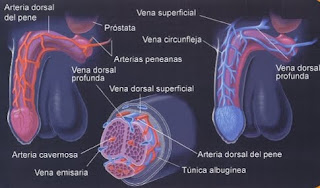Since an erection requires a sequence of events, impotence can occur when any of the events is disrupted. The sequence includes nerve impulses in the brain, spinal column, and area of the penis, and response in muscles, fibrous tissues, veins, and arteries in and near the corpora cavernosa.
Damage to arteries, smooth muscles, and fibrous tissues, often as a result of disease, is the most common cause of impotence. Diseases--including diabetes, kidney disease, chronic alcoholism, multiple sclerosis, atherosclerosis, and vascular disease--account for about 70 percent of cases of impotence. Between 35 and 50 percent of men with diabetes experience impotence.
Surgery (for example, prostate surgery) can injure nerves and arteries near the penis, causing impotence. Injury to the penis, spinal cord, prostate, bladder, and pelvis can lead to impotence by harming nerves, smooth muscles, arteries, and fibrous tissues of the corpora cavernosa.
Also, many common medicines produce impotence as a side effect. These include high blood pressure drugs, antihistamines, antidepressants, tranquilizers, appetite suppressants, and cimetidine (an ulcer drug).
Damage to arteries, smooth muscles, and fibrous tissues, often as a result of disease, is the most common cause of impotence. Diseases--including diabetes, kidney disease, chronic alcoholism, multiple sclerosis, atherosclerosis, and vascular disease--account for about 70 percent of cases of impotence. Between 35 and 50 percent of men with diabetes experience impotence.
Surgery (for example, prostate surgery) can injure nerves and arteries near the penis, causing impotence. Injury to the penis, spinal cord, prostate, bladder, and pelvis can lead to impotence by harming nerves, smooth muscles, arteries, and fibrous tissues of the corpora cavernosa.
Also, many common medicines produce impotence as a side effect. These include high blood pressure drugs, antihistamines, antidepressants, tranquilizers, appetite suppressants, and cimetidine (an ulcer drug).



